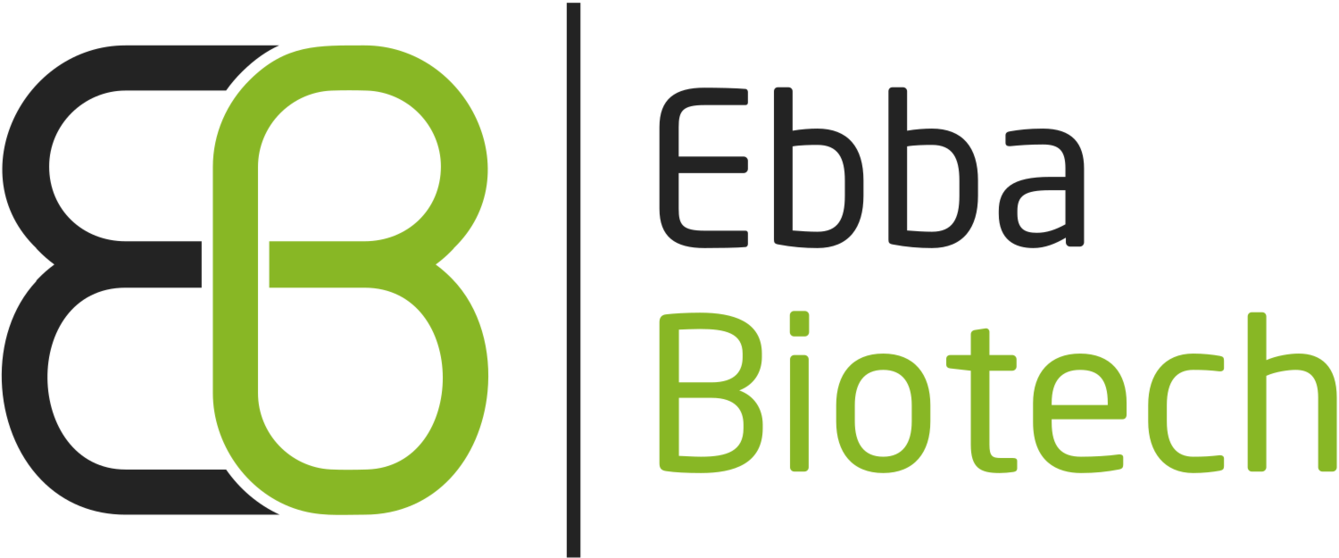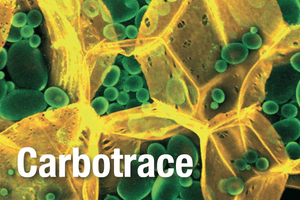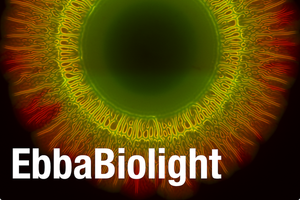Video clips about Optotracing
Ebba Biotech welcomes you to tune in to our webinar featuring Dr. Michael Morten from Imperial College London. During his talk titled "Characterisation of pathological protein aggregates at single-molecule resolution", Dr. Michael Morten will present his research using Amytracker.
Dr. Michael Morten is a postdoctoral research associate in Yu Ye’s group at the Department of Brain Sciences, Imperial College London. His research focuses on developing imaging techniques to study protein aggregates using single-molecule localisation microscopy (SMLM). These methods are applied to image aggregates in a range of environments, including aggregates immobilised on coverslips, internalised in live and fixed cells, and present in situ within tissue samples. By analysing aggregate morphology across these systems, his work reveals new insights into the cellular mechanisms that govern aggregate spreading and clearance, and highlights the diversity of aggregate species in proteinopathies such as Alzheimer’s disease, Parkinson’s disease, and other dementias.
Ebba Biotech welcomes you to tune in to our webinar featuring Prof. Bartosz Plachno from Uniwersytet Jagielloński w Krakowie. He presents his research using Carbotrace to visualize transfer cells in the glands of carnivorous plants.
Prof. Płachno is a biologist with a particular interest in carnivorous plants. His main research tool is microscopy, especially electron microscopy, and he is particularly interested in the functioning of carnivorous plant traps in the context of different glandular structures and surface specializations. Currently, he is focusing on cell walls in glandular cells (their composition and specialization).
Ebba Biotech welcomes you to tune in to our webinar featuring Dr. Timothy Audas from Simon Fraser University. Dr. Audas will present his research using Amytracker to explore the detection of functional amyloids in stress-treated mammalian cells.
Dr. Audas is an Associate Professor and Canada Research Chair at Simon Fraser University. In the Department of Molecular Biology and Biochemistry, his team studies stress response pathways that eukaryotic cells use to cope with harsh environmental conditions. Their primary focus is understanding the formation/function of natural amyloid aggregates, which share many biophysical characteristics with the toxic plaques and tangles that form in patients suffering from Alzheimer’s, Parkinson’s, and Huntington’s diseases. Dr. Audas hopes that gaining insight into how these physiological amyloids assemble and disassemble will lead to the development of new therapeutic strategies for the treatment of debilitating neurodegenerative disorders. (Read more about Dr. Audas' work on his groups: website
Ebba Biotech welcomes you to tune in to our webinar featuring Dr. Ramon Maset from University College London. During his talk, Dr. Maset will present his research about the role of biofilms in urinary tract infections and highlight how the use of advanced tools like EbbaBiolight can help deepen our understanding of these infections.
Dr. Maset graduated in Biochemistry and Biomedical Science (University of Valencia, Spain), followed by a research internship at the University of East Anglia (UK). He completed an MSc in the Interdisciplinary Biomedical Research Programme (IBRP) at the University of Warwick (UK), which was funded by the Medical Council Research (MRC). His PhD project was performed under the supervision of Professor Sebastien Perrier and Dr Freya Harrison on antimicrobial polymers against biofilms. The project aimed to tackle the antimicrobial resistance (AMR) crisis through an interdisciplinary approach. After his PhD, Dr. Maset was awarded a UK Medical Research Council (MRC) Early Career Fellowship to gain experience in research in the private sector. His project at 5D Health Protection Group (Liverpool, UK) aimed to discover the synergistic activity of metal ions with antibiotics in wound dressing to treat biofilms in chronic wound infections. His postdoctoral research in Prof. Rohn’s group is performed under the Beyond Antibiotics Programme Grant from the UK Engineering and Physical Sciences Research Council at University College London (UCL). The project focuses on the host-pathogen interaction, biofilm formation, and antimicrobial response of urinary tract infections (UTIs) using a 3D human bladder organoid model. The project involves an interdisciplinary approach combining advanced 3D tissue culture, microfluidics engineering, and state-of-the-art imaging techniques including confocal microscopy to better understand the host-pathogen interactions in the context of UTIs.
Ebba Biotech welcomes you to tune in to our webinar featuring Dr. Frederik Zitzmann from the University of York. During his talk titled "Incorporating Carbotrace as a problem solver in a biorefinery design process.", Dr. Zitzmann will discuss how we can use novel technologies such as visualising with Carbotrace to revolutionise the world of sustainable materials.
Dr. Frederik Zitzmann is a Green Chemistry researcher with particular interest in biorefinery design, industrial scale-up as well as client-focused research & development of products. He has an extensive background working on microalgae in collaboration with various start-ups and has designed microalgal biorefinery schemes incorporating sustainable and cutting-edge methods for a holistic product development process. His fascination lies in the breadth of sustainable chemistry happening all across the globe and is eager to continue making a difference tackling the 21st century’s numerous challenges.
Ebba Biotech welcomes you to tune in to our webinar featuring Assistant Professor Oxana Klementieva from Lund's University.
During her talk titled "Amytracker - A New Frontier in Imaging of Amyloid Structures in Tissues", Oxana Klementieva will detail her cutting-edge research into mechanisms of amyloid aggregation using novel imaging techniques.
Read more about her work here:
- MMS Lab: https://mmslab.net/
- Medical Microspectroscopy: https://www.lunduniversity.lu.se/luca...
- NanoLund: https://www.nano.lu.se/start
About Oxana Klementieva I am an Associate Professor in the Department of Experimental Medicine at Lund University. I did my Ph.D. in 2012 in Barcelona and moved to Lund as a postdoc. In 2018, I established a successful research group, the Medical Micro-spectroscopy Lab (MMS Lab) at Lund University’s Medical Faculty. Our research goal is the methodological development of novel approaches that allow the study of amyloid aggregation at the nanoscale in neurons and tissues; more about the project on our website is mmslab.net. The lab currently comprises a team of researchers including BSc, MSc, PhD, and postdoctoral researchers.We utilize cutting-edge technologies available at synchrotron facilities MAX IV in Lund and SOLEIL in France. Our efforts have resulted in the development of a label-free super-resolution amyloid structure imaging approach, enabling direct imaging within neurons and tissues. Our work has been published in prestigious journals, including Nature Communications, Advanced Science, Acta Neuropathologica, Nature: Light, Science & Applications, and we also have a submission under review at JACS.
Ebba Biotech's first webinar in 2023 is dedicated to "Amyloid Fibril Polymorphism" which has recently been shown to be a hallmark of many proteinopathies. One of the leading authorities in this field is Professor Per Hammarström from Linköping University. During this talk titled "Amyloid fibril polymorphism in proteinopathies", Prof. Hammarström discusses his work with protein misfolding in different amyloid diseases and various enhanced analytical methods pushing the boundaries within the amyloid field. Read more about his work using an Amytracker-like molecule for Advanced Imaging of amyloid aggregates here.
Ebba Biotech welcomes you to listen to our newest webinar featuring Dr. Tharagan Kumar presenting his work from his time at KTH, the Royal Institute of Technology in Stockholm Sweden. During this talk titled “Cellulose in Cancer Diagnostics”, Dr. Kumar will be presenting his work breaking barriers in diagnostics using the Ebba Biotech Carbotrace molecules.
Dr. Kumar comes from a background in biotechnology on the nanoscale leading him to seek the link between science and technology in medicine. With this, his studies from bachelors level all the way to doctoral studies focused heavily on how modern technology can improve lives - and importantly - how to make it accessible. This has led him to seek opportunities within med-tech to understand each facet of the industry from concept, to funding to ultimately change lives.
Read more about Dr. Kumar and his research here: https://www.scilifelab.se/news/promising-diagnostic-tool-for-cancer-diagnostics/
Or about his publication here: https://www.ebbabiotech.com/blogs/carbotrace-publications/breaking-barriers-in-early-detection-of-cancer
Ebba Biotech welcomes you to listen to our resident expert from the Center for the Advancement of the Integrated Medical and Engineering Sciences (AIMES) at Karolinska Institutet, Sweden - Dr. Susanne Löffler.
During this talk titled "Opto-electronically active Materials for Infection Detection and Control", Dr. Löffler will be presenting AIMES research about using optotracers for infection detection and control.
Read more about Dr. Löffler's work at AIMES here: https://aimes.se/
As a Group Leader at the Center for the Advancement of Integrated Medical and Engineering Sciences (AIMES) based in Stockholm, Sweden, Dr. Löffler specialises in Organic Bioelectronics for Bacterial Infection. Her background in biomedical sciences and signal processing make her uniquely suited to develop novel and specialised tools for data management, visualisation and analysis for bacterial detection technologies.
With an academic career starting at the University of Lübeck with both an MSc in Molecular Life Sciences and a PhD covering the specialisation in neural recordings and microstimulation, Dr. Löffler now spends her time bringing new exciting scientific applications to the commercial and entrepreneurial space. This being done through her work consulting life science start ups whilst still maintaining her position at AIMES.
DISCLAIMER
Dr. Löffler describes research using optotracers. The optotracers described during the webinar are commercially available under the product family name EbbaBiolight, which are marketed and sold by Ebba Biotech.
The Research Square video provides a summary of a publication by Choong et al. about a new semi-high throughput metod to monitor biofilm formation in Salmonella using EbbaBiolight. Please have a look on our summary article for more information.
Ebba Biotech welcomes you to listen to Dr. Ashraf Zarkan from University of Cambridge presenting his work on antibiofilm therapies for urinary tract infections using EbbaBiolight.
About the speaker: Ashraf Zarkan is a microbiologist with a pharmaceutical background, holding a PhD in Biochemistry from the University of Cambridge. He did his bachelor’s degree in Pharmacy and Pharmaceutical Chemistry followed by an MSc in Microbiology. He has a broad repertoire of training skills that range from experimental research to computational approaches to data analysis. Ash is passionate about tackling the increasing problem with antibiotic resistance, and his research has been focused on developing antibiotic adjuvants. He has a solid experience in bacterial signalling and antibiotic action, side effects, and combinations with adjuvants.
Abstract: Serious bacterial infections represent an unprecedented worldwide threat, due mainly to the emergence of antibiotic-resistant bacteria for which we have limited therapies. Antibiotic resistance is on the rise and has recently been identified as one of the World Health Organization’s global health challenges in the next decade. A key aspect of the antibiotic resistance problem is the ability of bacteria to form biofilms, which provide protection from both antibiotics and the host immune system. Biofilms are implicated in chronic infections such as urinary tract infections (UTIs). UTIs are among the most prevalent bacterial infections, affecting 150 million people per year worldwide, with 75% of infections occurring due to uropathogenic E. coli. Research by Dr Zarkan and his colleagues from the University of Cambridge highlighted the inhibition of an E. coli enzyme as a plausible route to inhibit biofilm formation, thereby reduce pathogenicity and increase antibiotic effectiveness in UTIs. In this webinar, you will learn how a collaboration between the University of Cambridge and Ebba Biotech AB successfully confirmed the antibiofilm properties of a set of novel inhibitors in clinical strains of uropathogenic E. coli. The current focus is in optimising these hits and completing pre-clinical development to be able to move further into clinical trials.
Ebba Biotech welcomes you to listen to Professor Ulrica Edlund from the Royal Institute of Technology (KTH) in Stockholm and her revolutionary work with Carbotrace and nano-materials.
The webinar titled "Selective method for spectral identification and recovery of polysaccharides from biorefining" explains how she uses Optotracers, like Carbotrace, in her research to discover and characterise renewable resources for biorefinement.
As a leading researcher in her field, Prof. Edlund contributes to reach UN sustainability goals by paving the way for a greener future moving towards renewable materials and circular economy. Her passion for finding sustainable solutions to maximise the potential of natural resources such as biomass has also led her to become the Vice Director of the research consortium AIMES (Centre for the Advancement of Integrated Medical and Engineering Sciences).
Ebba Biotech welcomes you to listen to Prof. Resia Pretorius present her research findings using the Amytracker molecules. Her presentation titled “Consequences of coagulation in health and disease: The use of fluorescent markers” will detail past work with the Amytracker molecules within her group and her new exciting work with Long Covid patients.
DISCLAIMER: Prof. Pretorius presentation is purely research based and for informational purposes only. This presentation contains no clinical advice for patients. If you have any health issues please contact your healthcare providers.
On the first of June 2021, Ferdinand Choong, Ebba Biotech's co-founder, and Assistant Professor at Karolinska Institutet and AIMES (Center for the Advancement of Integrated Medical and Engineering), presented his research using Ebba Biotech's optotracers at the digital event Lab & Diagnostics of the Future 2021, held by Life Science Sweden.
At this event, Ferdinand spoke about Ebba Biotech's optotracers multifunctional tracer for disease research and diagnostics. He explains the technical concept in large and Ebba Biotech's three product series,
Amytracker - used to detect amyloids and other protein aggregates,
Ebba Biolight - used to detect bacteria and biofilm,
Carbotrace - used for mapping composition of biobased material.
At AIMES, Ferdinand is applying optotracing to improve research and diagnostics of infection, where bacterial infection has a significant role, and biofilm might be the key reason why bacterial infection exists, which he describes in more detail.
On the first of June 2021, Ferdinand Choong, Ebba Biotech's co-founder, and Assistant Professor at Karolinska Institutet and AIMES (Center for the Advancement of Integrated Medical and Engineering), presented his research using Ebba Biotech's optotracers at the digital event Lab & Diagnostics of the Future 2021, held by Life Science Sweden.
At this event, Ferdinand spoke about Ebba Biotech's optotracers multifunctional tracer for disease research and diagnostics. He explains the technical concept in large and Ebba Biotech's three product series,
Amytracker - used to detect amyloids and other protein aggregates,
Ebba Biolight - used to detect bacteria and biofilm,
Carbotrace - used for mapping composition of biobased material.
At AIMES, Ferdinand is applying optotracing to improve research and diagnostics of infection, where bacterial infection has a significant role, and biofilm might be the key reason why bacterial infection exists, which he describes in more detail.
On the first of June 2021, Ferdinand Choong, Ebba Biotech's co-founder, and Assistant Professor at Karolinska Institutet and AIMES (Center for the Advancement of Integrated Medical and Engineering), presented his research using Ebba Biotech's optotracers at the digital event Lab & Diagnostics of the Future 2021, held by Life Science Sweden.
At this event, Ferdinand spoke about Ebba Biotech's optotracers multifunctional tracer for disease research and diagnostics. He explains the technical concept in large and Ebba Biotech's three product series,
Amytracker - used to detect amyloids and other protein aggregates,
Ebba Biolight - used to detect bacteria and biofilm,
Carbotrace - used for mapping composition of biobased material.
At AIMES, Ferdinand is applying optotracing to improve research and diagnostics of infection, where bacterial infection has a significant role, and biofilm might be the key reason why bacterial infection exists, which he describes in more detail.
There are a couple of common techniques today, such as Congo Red Assay which is used to analyze biofilms, but the issue with this technique and many others is that it needs a trained eye for valid analysis and correct conclusions being drawn. When using EbbaBiolight instead, a more distinct answer as to whether biofilm exists or not is given, which makes this technique easier to use and conclusions are more easily drawn from an experiment.
Researchers from the Royal Institute of Technology and Karolinska Institutet in Sweden reported about an environmentally friendly process to obtain pure cellulose nanofibrils from the green macroalgae ulva lactuca (Wahlström et al. (2020) Cellulose 27, 3707–3725). Analysis of the monosugars revealed that the extracted cellulose contains mainly glucose, but also a fraction of xylose. Carbotrace 540 allowed the researchers to analyze the carbohydrates in its polymeric state and was key to uncover that the macroalgae contain a mixture between highly pure and a xylose-glucose polysaccharide, such as xyloglucan.
The video clip shows the eco-friendly extraction of of pure cellulose from green macroalgae from the Swedish west coast.
A research paper (Choong et al. (2018) Scientific Reports, 8, 3108) uses a Carbotrace-like molecule to visualize the location and structure of cellulose in plant cells.
The video below explains why it is so difficult to switch to plants for producing renewable resources and how Carbotrace can help in the process.
In a research paper published in Cellulose (Choong et al. (2019) Cellulose, 26, 4253–4264), our structure-responsive optotracer molecule Carbotrace 680 was used to demonstrate the potential of optotracing for carbohydrate anatomical mapping and spectral imaging.
The video clip below illustrates why our current model of Take, Make, Dispose is draining our planet of natural resources and why circular economy and renewable resources are the answer. Learn how Carbotrace can help to identify renewable resources in plant biomass and support circular economy in the food & beverage, pharmaceutical and chemical industry.
Ebba Biotech welcomes you to listen to Dr. Karen Butina present her research findings using EbbaBiolight-like molecules. This webinar will focus on the use of the Optotracer molecules and technology applied on Staphylococci bacteria. You can read more about Dr. Butina's work here. DISCLAIMER: Dr. Butina describes her work using HS-167 molecules. These are predecessor molecules to what is now commercialised under the product family name EbbaBiolight, which are marketed and sold by Ebba Biotech.
Originally from Slovenia, Dr. Butina received her Bachelor’s degree in Biotechnology in Ljubljana before pursuing her Masters and PhD at KI in Sweden. At KI she was part of the pioneering team (Prof. Richter Dahlfors Group) behind the Optotracer technology within microbiology. Her extensive background in interdisciplinary work has broadened her interests within the medical field and she continuously strives to find out how things work and develop applications to contribute to an equal society.


